A new report published in the journal Science Advances revealed that the US produces more plastic waste than any other nation. It also ranks as high as third among countries causing coastal plastic pollution when factoring in scrap plastic exports plus illegal dumping and littering. This new research contradicts previous assumptions that the US manages and disposes of its plastic waste properly. It also takes the spotlight off Asian countries, which often get the majority of the blame for marine litter.
A 2010 study ranked the US 20th among countries contributing to ocean plastic pollution; however, it didn’t account for plastic scrap exports. Around 5 to 13 million metric tons (Mt) of plastic ended up in the ocean that year. That material came from both developing and high-income countries.
The new study which came out on October 30, 2020. It indicated that the US generated 42 Mt of plastic waste in 2016, more than anywhere, globally. In the United States, we dumped between 0.14 and 0.41 Mt of this waste illegally. Countries which imported materials from the US for recycling improperly managed 0.15 to 0.99 Mt. Taking this data into account, the US contributed five times more to coastal plastic pollution in 2016 than in 2010. This puts the United States among the top plastic polluting countries globally.
According to the most recent plastic waste generation data from 2016, the US shipped more than half of its recycled plastics abroad. This equates to around 1.99 Mt of 3.91 Mt of plastic collected for recycling shipped overseas for processing. Of this, 88% of exports went to countries that struggled to recycle plastics adequately. 15-25% got labeled low-value or contaminated and couldn’t meet standards for recycling.
How researchers use this data
Using this data, researchers estimated that around 1 Mt of plastic waste from America went into the ocean. Scientists from Sea Education Association, DSM Environmental Services, University of Georgia, and Ocean Conservancy analyzed the data.
“For years, so much of the plastic we have put into the blue bin has been exported for recycling to countries that struggle to manage their own waste, let alone the vast amounts delivered from the United States,” said Dr. Kara Lavender Law, lead author of the study and research professor of oceanography at Sea Education Association.
“And when you consider how much of our plastic waste isn’t actually recyclable because it is low-value, contaminated, or difficult to process, it’s not surprising that a lot of it ends up polluting the environment.”
Drawing from 2016 data, the report also estimated that 2-3% of all US-generated plastic waste ended up polluting the environment domestically. This amounts to between 0.91 and 1.25 Mt. So along with waste exports, the US contributed to around 2.25 Mt of plastic pollution. Of this, up to 1.5 million metric tons of plastics ended up along coastlines. Taking this data into account, the U.S. ranks among the top three countries for coastal plastic pollution.
“The United States generates the most plastic waste of any other country in the world, but rather than looking the problem in the eye, we have outsourced it to developing countries and become a top contributor to the ocean plastics crisis,” said Nick Mallos, senior director of Ocean Conservancy’s Trash Free Seas program and a co-author of the study. “The solution has to start at home. We need to create less, by cutting out unnecessary single-use plastics; we need to create better, by developing innovative new ways to package and deliver goods, and where plastics are inevitable, we need to drastically improve our recycling rates.”
Revealing and alarming trends
The study pointed out that the U.S. contributed 17% of total plastic waste. That number is despite making up just 4% of the global population. On average, Americans generated almost double the plastic waste per capita as residents of Europe.
“Previous research has provided global values for plastic input into the environment and coastal areas, but detailed analyses like this one are important for individual countries to further assess their contributions,” said Dr. Jenna Jambeck, Distinguished Professor at the University of Georgia’s College of Engineering and a co-author of the study. “In the case of the United States, it is critically important that we examine our own backyard and take responsibility for our global plastic footprint.”
“For some time, it has been cheaper for the United States to ship its recyclables abroad rather than handle them here at home, but that has come at great cost to our environment,” said Natalie Starr, principal at DSM Environmental Services and a co-author of the study.
“We need to change the math by investing in recycling technologies and collection programs, as well as accelerating research and development to improve the performance and drive down the costs of more sustainable plastics and packaging alternatives to address the current challenge.”
A grim warning
This year, The Pew Charitable Trusts partnered with environmental consulting firm SYSTEMQ, releasing a report about plastic waste. In the report, they estimated that plastic pollution in the ocean would triple by 2040 unless all nations take serious action. It will take both reducing plastic consumption and better management of recycling and trash to combat this issue.
While it may seem daunting, we have already begun taking steps to clean up the environment. In China, for example, the construction of incineration plants led to a 60% decrease in waste generation. In the U.S., laws are now in place to ban the use of plastic bags and straws in several states.
Final thoughts on the study about US plastic pollution
A new study revealed that the US generates more plastic waste than anywhere globally, despite previous assumptions. Asian nations have taken most of the blame for the problem. But prior data didn’t include figures on plastic scrap exports. Therefore, the U.S. ranks number one for overall plastic pollution and third for contributing to coastal plastic waste. However, by reducing consumption and managing our trash more effectively, we can start to shift to improve results.
















 Community
Community

